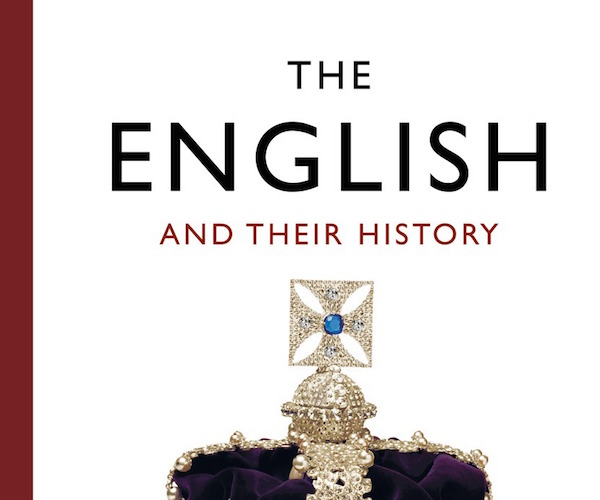Book Review: “The English and Their History” — A Panoramic View of the Past
With this excellent volume, Robert Tombs offers further proof that there should be no variance between good history and good writing.
The English and Their History by Robert Tombs. Knopf, 1040 pages, $27.35.

By Thomas Filbin
Is history now officially a social science? Or is it still listed in university course catalogues as one of the humanities? Large scale histories of wars, civilizations, and movements were not considered science in any sense when Thucydides, Gibbon, or Hume wrote them — it was an interpretive art. Facts were generally established, such as that Rome fell, or that Louis XVI lost his head in the battle over absolutism and privilege, but the whys and wherefores driving such events came from the historian’s explanatory noggin.
But there is the suspicion that the sun has set on such grand projects; sweeping narratives and universal generalizations are now suspect, seen as arrogant, unjustified by empirical evidence. A variety of microhistory is in vogue today, with historians plowing through shipping manifests, immigration records, and notes of harvests and famines. According to this ideologically-correct school, only data can show us the “truth,” small “t” — interpretations, conclusions, speculations are driven by the interests of the ruling class. History as seen from below was the rage in Britain in the 1960s and ’70s, exemplified by the superb writing of Christopher Hill and E.P. Thompson. Their radical approach was warranted at that time because it provided a fresh look at familiar terrain. But it assiduously avoided the big picture. And that modesty seems to have become a crippling default. Writing a cautious assessment of some small part of the world now seems the most that historians feel comfortable to offer and, as skilled as that might be, it cannot be the whole story because it never aims for one.
A new book by Cambridge historian Robert Tombs, however, rebuts the notion that large history projects are dead. This panorama of the English nation over 2000 years is not so much a canvas as a large wall mural that depicts, narrates, and brings judgment to bear on events. Tombs is the coauthor (with Isabelle Tombs) of the fabulously entertaining That Sweet Enemy, the story of the complex relationship between the English and the French over the past few hundred years. With this volume he offers further proof that there should be no variance between good history and good writing. Tedious charts and tables are not Tombs’ domain, nor is there any ideologically assuaging unifying theory proffered; the story is in its dramatic telling.
He starts with the beginning, the settlement of the isles after the ice age, and advances through Roman Britain, feudalism, the Middle Ages, the beginnings of the modern age, despotism, civil war, the Enlightenment, material progress through industrialism, reform, empire, world conflicts, and finally whatever place England has in the world today. Things like the common law, parliament, religious liberty, and cultural change warrant as much space as wars and kings.
An example of Tombs’ expansive treatment is his narrative about the King James Bible, a wonder of writing, especially because it was done by committee. James disliked Tyndale’s English translation, and also the Geneva Bible “…which offended his elevated view of monarchy, ‘savouring too much of dangerous and traitorous conceits.’” Uniformity of worship had a unifying effect on the country; Tombs notes, “As one historian has remarked with only slight hyperbole, for centuries to come it would be possible to check one’s watch at 11:08 on a Sunday morning and know that at that moment everyone in the land was intoning the same psalm.”
Tombs points out, too, that this bible and The Book of Common Prayer were linguistically as well as religiously significant. “A standard form of English became familiar across the country, without replacing spoken dialects.”
He devotes much time to the Civil War Period, the execution of Charles I, the puritanical rule of Cromwell, and the lifting of the fog with the merry restoration of Charles II. The unlucky Stuart dynasty gave way with the Glorious Revolution to a more constitutional and limited monarchy which was the beginning of British political modernity. Intellectual and social history count as much for Tombs as political machinations; he devotes pages to Newton, Hobbes, and Locke, feeling they are as much a thread in the weave as any parliamentary act.
The eighteenth century and the loss of the American colonies stunned the English, but the early nineteenth century saw the industrial revolution restore the country’s position. With raw materials from India, Africa, and Asia, the might of textile and other manufacturing set England off on a trajectory of wealth. It was also a period of change; the Reform Bill of 1832, the rise of the workers and their demand for basic rights, and the impact of Darwin and science generally in weakening traditional religious sentiment.
By the death of Queen Victoria, British dominion extended to much of the planet and it was their century. The imperial era of 1815-1918 was perhaps the closest the world has ever come to acknowledging the unchallenged supremacy of one country.
The period from World War One to the present consumes a third of the book, perhaps because of its direct relevance to today. 1066 pales in comparison to the mischief that continues to haunt us after the ham-fisted reorganization of the Middle East after the Versailles Treaty conference. Tombs gives us the arrogant backstory: “The real decisions were taken in private by Lloyd George, Clemenceau, Wilson, and sometimes the Italian prime minister, Vittorio Orlando. Said one participant: ‘No four kings could ever have conducted the conference on more autocratic lines.’”

Author Robert Tombs. Photo: Blazej Mikula.
After World War Two, England slowly, and then more rapidly, lost its dominions, retreating to a smaller place in the world. Even the return to charismatic power of Churchill could not reverse the inexorable flow of events towards nationalism and independence in the colonies.
England’s cultural revolution after the 1960s encouraged a shift toward liberation. Conservative, commercial people increasingly embraced secularism, personal freedom, and a skepticism about crown and church, the aristocracy, and the old ways generally. It turns out that Cool Britannia was a better place to live and work for most Englishmen than the class-laden world of Downton Abbey.
Tombs writes, “The Tory MP Norman St. John Stevas called this a ’permissive society,’ a good term: what these changes had in common was the abolition of a rather stern, self-disciplined, prudish, male-dominated culture.” He goes on to note, “Women had for centuries been the bed-rock of church-going, and when many abandoned it, Christianity in England lost much of its substance.”
In conclusion, Tombs says that the fact that England is an island is both a real and symbolic statement. Part of Europe, but not connected to it; mother of the English speaking world, though distanced from Americans, Canadians, or Australians. Lamenting the passing of its supremacy, England today has an identity, but the country is not always sure how and where its sense of itself fits into the world.
There will always be an England, but Tombs poses some questions as to what it will look like. History, he argues, will give us some clues to how it might be shaped: “We owe respect to the past, as we do to other societies today, not for the sake of our predecessors, who are beyond caring, but for our own sake.”
Thomas Filbin reviews books for literary magazines, academic journals, and newspapers.
Tagged: English History, knopf, Robert Tombs, The English and Their History
